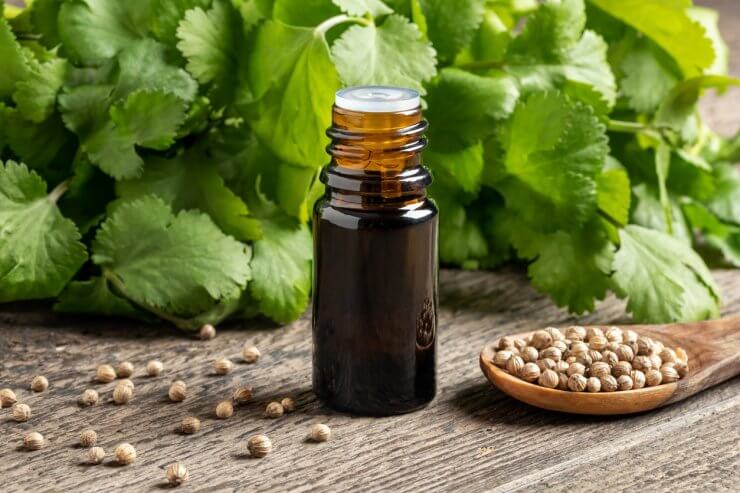
Cilantro leaves, coriander seeds on a spoon, and a bottle of coriander essential oil
Cilantro is delicate, but mighty! Rich in antioxidants and plant compounds, cilantro can protect your heart, increase good (HDL) cholesterol, lower your blood pressure, protect against cancer, and help control blood sugar. The vitamin C in cilantro helps boost your immune system and helps neutralize free radicals in your body. And your body can’t store vitamin C, so you need to be sure to get your daily requirement.
Here are some of the other ways cilantro contribute to good health—plus a couple notes of caution.
Heart health
Heart disease is the most common form of death worldwide. Consumption of foods high in vitamin C, like cilantro, has been linked to reduced risk of heart disease.
Vitamin C also contributes to lower incidences of stroke, especially among people who are overweight or have high blood pressure. However, people who drink or smoke heavily are less likely to enjoy the added benefits of vitamin C.
Research shows cilantro may help lower cholesterol. The herb is also a diuretic, ridding the body of excess water which helps lower blood pressure. Further, use of herbs and spices, like cilantro and coriander, helps season foods without adding salt—another way to lower blood pressure.
Cancer prevention
Studies have linked the antioxidants in cilantro to a possible reduction in the risk of many types of cancer. Researchers think this may be due to plant compounds found in cilantro, like terpinene, quercetin, and tocopherols, which may have anticancer, immune-boosting, and neuroprotective effects.
Blood sugar health
Coriander seeds, extract, and oils may all help lower blood sugar. In fact, people who have low blood sugar or take diabetes medication should practice caution with coriander because it’s so effective in lowering blood sugar.
Digestive health
Oil extracted from coriander seeds shows signs of benefitting healthy digestion. An herbal medicine containing this oil helped decrease bloating and digestive discomfort in one study. In Iran, coriander extract is used as an appetite stimulant.
Brain health
The anti-inflammatory compounds in the cilantro plant may be helpful in combating brain ailments including Parkinson’s, Alzheimer’s, and multiple sclerosis. In animal studies, coriander extract and cilantro leaves protected against nerve cell damage and improved memory, respectively. Another study showed that coriander extract is nearly as effective as Diazepam, a common anxiety medication, at reducing symptoms of anxiety.
Pregnancy health
Folate is essential for the healthy development of babies in order to prevent neural tube defects, such as spina bifida. Prenatal vitamins include folate (also called vitamin B9), but cilantro is a great natural source of this essential vitamin.
Infection fighting
Coriander contains compounds that can help fight infection and protect against foodborne illnesses. The compound dodecanal may help fight food poisoning from bacteria such as salmonella. And one study showed that coriander extract is helpful in fighting the bacteria that cause urinary tract infections.
Skin health
The vitamin C in cilantro may contribute to healthier skin—reducing the development of wrinkles and contributing to more hydrated skin and fewer blemishes.
Cilantro hazards
While cilantro can do some great things for your health—fight inflammation; lower blood pressure—not everyone can—or should—eat this plant.
- Aversion: Some people have a genetic aversion to cilantro that causes them to equate the taste with dish soap. These people have a variation in a group of olfactory-receptor genes that allows them to strongly perceive the soapy-flavored aldehydes in cilantro leaves. Interestingly, further studies show that the prevalence of this genetic difference varies widely by ethnographic makeup.
- Allergy alert: A small percentage of people are allergic to cilantro and can break out in hives and experience facial and throat swelling after eating it. Some people also experience hives and itching if the plant touches their skin.
- Low blood sugar caution: People with low blood sugar should be cautious with how much cilantro and coriander they eat. The plant contains enzymes that can reduce blood sugar, so it should be eaten in moderation if you are concerned about low blood sugar.
Did you know that cilantro and coriander are so healthful? Did you know about the potential pitfalls of consuming cilantro? Please tell us how you use cilantro.


 Previous
Previous

